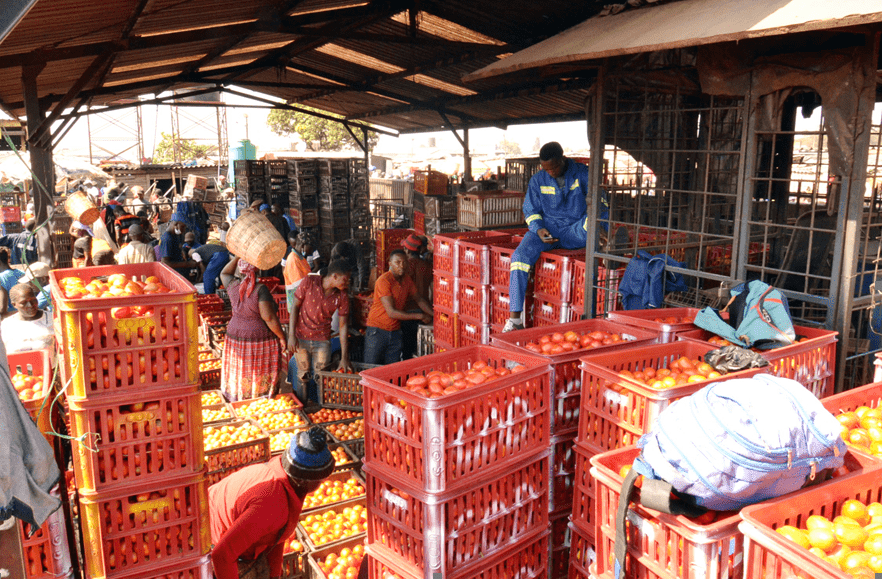|
Getting your Trinity Audio player ready...
|
Writes Charles Dhewa
Fundamental shifts in African food systems are accelerating changes in the food distribution landscape, blurring traditional boundaries between distributors, wholesalers, and retailers. These structural challenges are dismantling the wholesaling business model, forcing wholesalers to continuously rethink their aggregation and distribution strategies to remain relevant. In a fast and fluid distribution landscape driven by ICTs, it appears aggregation is becoming more viable than traditional wholesaling. Aggregation is simply mobilizing food, sorting, and quickly distributing it.
Shift in value creation
There is no doubt that African food systems are going through several transformative changes such as the decreasing relevance of wholesaling as well as the shift in value creation toward fast distributors like runners and traders. In many African countries, wholesalers are losing ground and market share to retailers, runners, tuckshops, and transporters whose food handling and distribution models are faster, furious, and fluid. Wholesalers have to expand their roles beyond their traditional core and build enough ability to generate additional advantages for customers through value-added services. It is no longer enough to be just a wholesaler. Who needs a wholesaler when ICTs are enabling consumers to speak directly with farmers and food processors?
New partnerships and relationships
Traders in mass food markets are bonding together to build sophisticated distribution partnerships that are taking the traditional roles of wholesalers. These traders are also investing in understanding food items, production practices, and product differentiation. They are also providing diverse services to food producers like farmers and incentives to consumers as part of forging long-term strategic partnerships with key actors including transporters who are also handling packaging. Through this level of consolidation, informal food traders, retailers, and runners are altering the food distribution landscape, gaining additional leverage and influence at the expense of wholesalers.
Instead of trying to protect wholesalers, African policymakers should study and understand these dynamics in order to generate appropriate frameworks for building genuinely inclusive business models that speak to the evolving context. Policies should not continue to blindly protect traditional models like wholesaling but recognize the new emerging models that respect the fact that customers are now increasingly looking for a broader set of choices and more sophisticated food products that traditional wholesalers cannot provide but can be found in mass markets, for instance. Captive distribution models are being disrupted rapidly, giving way to new distribution channels controlled by new economic actors who should also be recognized for their roles in ensuring food and nutrition security for the majority and sources of income for marginalized groups.
More potential for new technologies
While most of the disruption in food distribution systems can be attributed to digital technologies such as the proliferation of mobile technology, there is still emerging potential for Artificial Intelligence (AI) to influence the continuous redefinition of wholesaling and the speed at which distribution happens as well as improving customer satisfaction. More agile competitors like retailers and runners are quickly developing broader distribution models in line with the seasonal nature of food production and availability. On the other hand, traditional wholesalers lack that kind of agility as they are still stuck in legacy models in which decisions on price changes are centralized.
In tandem with evolving consumer preferences, traders and food distributors with customized transport systems are colonizing value chains to address specific customer needs comprehensively. To stay alive, financial systems that have always derived comfort from financing wholesales are also being forced to design appropriate financial packages in new ways that engage with a wide range of food distribution actors including wholesalers, vendors, and runners.
All these changes in the African food distribution marketplace, along with continued uncertainty in the macroeconomic environment, will have significant implications on wholesalers’ operating models. To cope with dynamic, fast, and furious market conditions, wholesalers need to strengthen their capabilities in building strategic distribution partnerships. Others are awakening to this reality by working with tuckshop owners and vendors who are always close to household customers. Cultivating such symbiotic relationships is more productive than coercing the government to protect them from the fast-evolving competition. Investment in data collection and digital solutions can go a long way in giving wholesalers the full picture. It will also enable more seamless interaction with customers and fluid experience sharing on real-time food flows in diverse supply chains.
AUTHOR’S CONTACT DETAILS
[email protected] / [email protected]/
Website: www.emkambo.co.zw / www.knowledgetransafrica.com
Mobile: 0772 137 717/ 0774 430 309/ 0712 737 430






